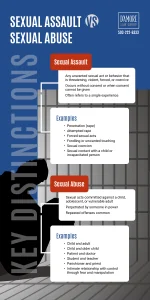
Sexual violence has an impact on millions of people each year in the United States. More than half of women and nearly one in three men have experienced sexual violence that involved unwanted physical contact in their lifetimes. It is a prevalent issue with devastating consequences for survivors, impacting their physical, emotional, and mental well-being.
One common source of confusion is understanding the difference between sexual assault and sexual abuse. While both involve unwanted sexual experiences and are serious criminal offenses, there are critical distinctions between them.
Sexual Abuse vs Sexual Assault: Definitions
What Is Sexual Abuse?
Sexual abuse refers to any non-consensual sexual contact or behavior characterized by a power imbalance, including unwanted touching, groping, forced exposure to pornography, or exploitation. It can take various forms, such as molestation, exploitation, or harassment. The perpetrator of the abuse often has a position of power or authority over the victim, such as:
- A parent,
- A caregiver,
- A relative, or
- A teacher.
This dynamic can further complicate the legal and emotional consequences of abuse.
Sexual abuse is often, but not always, associated with the sexual assault of minors. The abuse can be a single incident or ongoing, and it can occur between people of any gender and at any age.
What Is Sexual Assault?
Sexual assault is a broad term that includes a range of offenses that can involve non-consensual and forceful sexual conduct. The activity or conduct may include:
- Physical force,
- Violence,
- Threat,
- Intimidation,
- Manipulation
- Refusal to acknowledge the objections of the other person, or
- Intentionally causing another person’s intoxication with the purpose of assaulting them sexually.
Many forms of unwanted sexual activity are considered sexual assault, including:
- Rape,
- Attempted rape,
- Penetration with an object,
- Sexual coercion, and
- Unwanted sexual touching.
Sexual assault can happen to anyone, regardless of gender, age, or relationship with the perpetrator.
What’s the Difference Between Sexual Assault and Sexual Abuse?
Sexual Abuse vs Sexual Assault: Key Distinctions

Both sex abuse and assault involve unwanted sexual contact. If you are a survivor, the offense can severely impact your physical, emotional, and mental well-being. Therefore, the law takes these crimes seriously, and such offenses can lead to incarceration, fines, and civil lawsuits for the perpetrator. Both forms of violence require support and resources for survivors to heal and seek justice.
However, there are two key differences between sexual assault and sexual abuse.
Survivor’s Age
The primary legal distinction between sexual assault and sexual abuse is the victim’s age and capacity. Sexual assault involves non-consensual acts with an adult, while sexual abuse involves acts with a minor or someone legally unable to consent.
The age of the survivor generally differentiates sex abuse from sex assault. However, some state laws may have other differences. For instance, in the District of Columbia, all sex crimes are termed sexual abuse. Sexual assault typically involves adult survivors, while sexual abuse mainly refers to actions towards children, not adults. Furthermore, sexual abuse against children often refers to a pattern of abuse that happens over time—whereas sexual assault often refers to a single incident.
Consent
Sexual abuse can entail a variety of actions and behaviors, such as manipulation, threats, or pressure, which create a complex power dynamic where consent may be unclear. It primarily involves an evident lack of consent, with the survivor unable to or unwilling to agree to the sexual act. All 50 states recognize that children cannot provide informed consent to any sexual activity.
Understanding the Crucial Element of Consent
Consent is a clear, conscious decision by each participant to engage in mutually agreed-upon sexual activity. Consent is:
- Voluntary and must be given without coercion, force, threats, or intimidation; and
- Revocable and must be ongoing throughout a sexual encounter and can be revoked at any time by any participant.
There are instances where someone cannot give consent, including when they are in any of the following conditions:
- Subject to coercion, threats, manipulation, or force;
- Under the influence of drugs or alcohol;
- Unconscious; or
- Mentally incapacitated or incompetent due to illness or disability.
Consent must be given willingly and clearly and never assumed or implied.
Finding Help and Support As a Survivor
Many resources are available to help you heal and move forward, including hotlines, counseling services, and legal assistance. Notable sources of support include the following:
- RAINN National Sexual Assault Hotline: 800-656-4673
- National Sexual Violence Resource Center: 877-739-3895
- Crisis Text Line.
You can also contact local hospitals, community health centers, or mental health organizations to find confidential crisis support options and mental health resources in your area.
Your well-being is important; do not hesitate to seek help and support whenever needed.
Legal Ramifications of Sexual Abuse and Sexual Assault
The legal landscape surrounding sex assault and abuse in the United States can vary significantly by jurisdiction, making it a complex issue. Sexual assault typically falls under criminal law. However, some forms of sexual abuse may not be explicitly covered, depending on the circumstances. This can include instances of non-physical maltreatment or exploitation, which may be more challenging to categorize under existing criminal laws.
Also, it is possible to sue the perpetrator of your assault for monetary damages in some cases. This would be a civil lawsuit, not criminal in nature. The goal of a civil lawsuit is to get compensated for your losses from the assault or abuse. For example, if you had to go to years of counseling to overcome the damage of the abuse or if you suffered great emotional distress—these losses might be compensable. Speak to an attorney to determine your rights.
Despite these variations in legal definitions, it’s crucial to remember that the justice system takes all forms of sexual violence seriously.
Is There a Time Limit for Filing Sex Abuse or Sex Assault Charges?
For survivors of child sexual abuse, the Eliminating Limits to Justice for Child Sex Abuse Victims Act of 2022 ended any time constraints to file civil claims related to sex abuse crimes against minors, including sex trafficking, sexual exploitation of children, and forced labor.
All states have statutes of limitations on adult sexual assault and abuse criminal charges, which vary by state and can be complex. In most states, the statute of limitations for criminal sex assault ranges between three and 30 years.
However, not all states have a statute of limitations for felony sex crimes. In West Virginia and Kentucky, there is no statute of limitations for felony sex crimes.
Empowering Survivors to Find Healing and Justice with D’Amore Law Group
At D’Amore Law Group, we understand the overwhelming physical and psychological anguish that survivors of sexual crimes have experienced. That’s why our knowledgeable sexual abuse lawyers provide empathetic and knowledgeable legal representation to assist with your concerns and questions. We aim to explain your legal options clearly and simply.
With over 40 years of legal experience, we’ve helped countless survivors hold their perpetrators accountable and receive compensation for their pain and suffering. We aim to explain your legal options clearly, simply, and confidentially. Contact us today for a confidential consultation.
